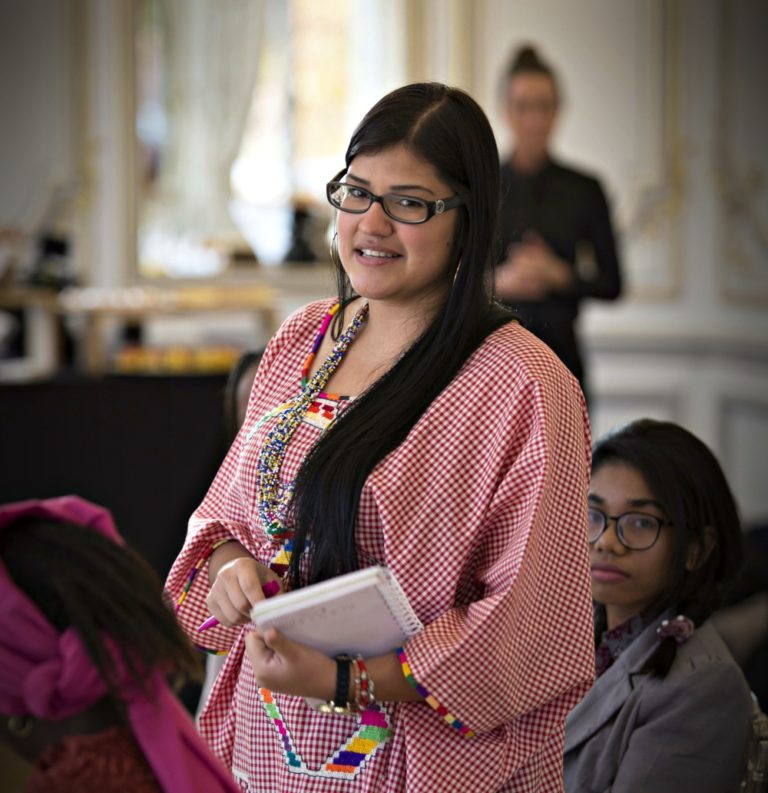Ensuring the “full and effective participation and equal opportunities for leadership at all levels of decision-making in political, economic, and public life” is a core pillar of Sustainable Development Goal 5 – Achieve Gender Equality and Empower All Women and Girls.
To achieve this we must invest in girls from a young age to strengthen their leadership skills, agency, and the confidence needed to make their voices heard in decision-making at all levels. Education is critical but it is also important to create opportunities for leadership development through training in public speaking, debating, and civic engagement at the local and global levels. This is how Maria, a youth activist from Venezuela has prepared for her upcoming participation at the United Nation’s Commission on the Status of Women (CSW62).
Plan International and the Continental Network of Indigenous Women (ECMIA) have collaborated to support a youth commission of indigenous girls and young women – including Maria -- with leadership skills to take charge. This group of trailblazers will soon take their case straight to world leaders during CSW62.
As a strong youth activist and member of this enthusiastic delegation of young, female, indigenous leaders, Maria prepared for CSW by penning this frank but hopeful message on behalf of her sisters:
“Dear United Nations,
Race, ethnicity and gender continue to be among the most important determinants of access to leadership and political participation across Latin America. The challenges faced by indigenous girls and young women are rife.
We are youth who started our journey in the movement for indigenous peoples when our mothers, grandmothers and relatives opened the space for us when we were little girls. Thanks to these spaces we were able to reaffirm the importance of our cultural identity. As we became older we realised more than ever the importance of being involved in decision making spaces.
This is because our realities have at times been rough. Our world is not always happy. Our wild territories have been exploited without our consent, our land militarized and the rights of our peoples violated. We have also been faced by people who discriminated and excluded us for the simple fact that we are young and indigenous. Our opinions and contributions have been dismissed because we are girls. Let me make this clearer, there is a negative perception that maintaining our culture and way of life is a waste of time and resources. Being young, indigenous and a girl can feel like triple discrimination - and we say no more.

As we became older we aspired to change these realities, and we are. It’s been with hard work that we have been able to position our agenda as young indigenous women to influence issues and decisions that concern us. Through intergenerational dialogue with ECMIA and Plan International’s school of leadership we have managed to build a space where indigenous youth across Latin America, can network, develop, and create common agendas so we can have an impact in key international spaces that can transform our realities at the local level.
This time we are heading straight to the Commission on the Status of Women (CSW). This space is important for us. Although we cannot intervene directly in the Commission, our role as civil society, as young indigenous girls and young women is important and we know what goals we want to achieve.
This year’s theme is a priority for us, and will be about empowering rural women and girls. At first glance, many people may believe or assume that indigenous peoples are implied in the definition of “rural” but that is not the case. While there are many indigenous communities that live in areas geographically classified as rural, they cannot be blanketed as rural communities. Moreover, there are indigenous communities based in other kinds of categories such as migrants, urban spaces and ancestral territories.
We want to make clear that public policies, plans and programmes discussed should have differentiated approaches to effectively engage indigenous communities. Furthermore, they should be constructed and executed with the full and effective participation of indigenous youth. This critically includes young indigenous girls and women. We must remember that indigenous people have their own cultural identity, language, worldview, leadership structures, and traditional ways of passing down knowledge and making decisions. For CSW to be successful, we must have a holistic vision and we will all be successful.
Like any other conference, we expect CSW to have its challenges, but it will be an incredible opportunity to build alliances and press for progress. We are hopeful and empowered to give the best of ourselves, share our insights and learn new knowledge.
See you soon.
With anticipation,
Maria and the Youth Commission of indigenous girls and young women”


